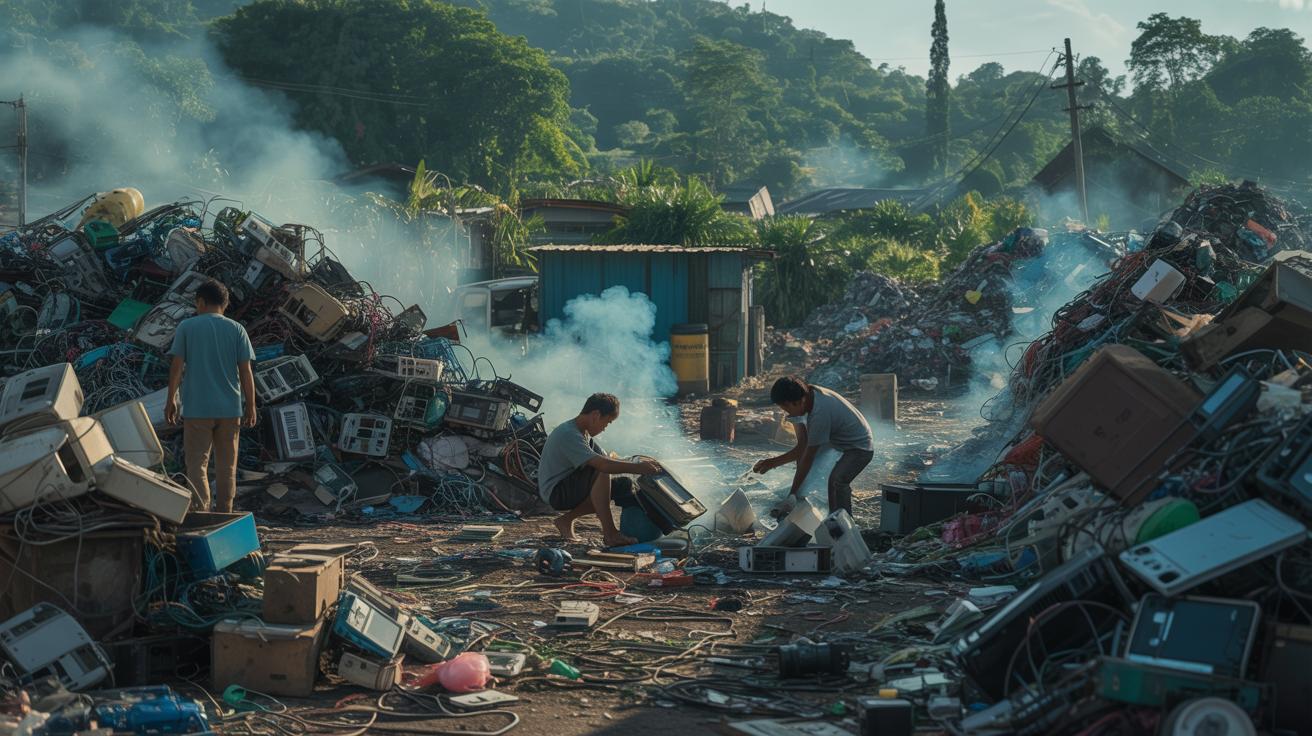What You Need to Know
- 🌍 Global E-Waste Influx: Thailand faces a surge of electronic waste imports following China’s ban, leading to a proliferation of unlicensed recycling facilities.
- ⚠️ Environmental Impact: Toxic substances from illegal recycling operations are contaminating soil and water, posing significant risks to local ecosystems and communities.
- 💰 Economic Drivers: The demand for valuable metals extracted from e-waste fuels a lucrative industry, despite the environmental damage it causes.
- 🔨 Government Crackdown: Thai authorities are ramping up efforts to shut down illegal facilities and enforce stricter regulations to combat the e-waste crisis.
- 🤝 International Responsibility: The situation highlights the need for global cooperation and stricter international regulations to manage and reduce electronic waste effectively.
In the heart of Thailand, a battle is raging against a formidable foe: electronic waste. As discarded gadgets flood into the country from around the globe, unlicensed recycling facilities have sprung up, threatening the environment and public health. These clandestine operations, often hidden from the authorities, are at the center of an environmental crisis that is growing with each passing day. With the stakes so high, Thailand has launched a full-scale crackdown to combat this menace. But can these efforts keep pace with the rising tide of e-waste?
The Rise of Unlicensed Recycling Facilities
The proliferation of unlicensed recycling facilities in Thailand is a direct consequence of international policies and local economic conditions. In 2018, China banned the import of electronic waste, forcing international shippers to find new destinations for their discarded electronics. Many turned to Thailand, where gaps in regulatory oversight provided fertile ground for illegal operations. These facilities, often located in rural areas, operate under the radar, processing e-waste without proper licensing or environmental safeguards.
Workers at these sites sift through mountains of scrap metal, circuit boards, and other debris, extracting valuable materials like copper and gold. While this process yields significant profits, it also releases toxic substances such as mercury and lead into the environment, posing serious risks to local communities. The Thai government, recognizing the magnitude of the problem, has initiated a task force to raid these illegal operations and enforce stricter regulations. Yet, the sheer volume of e-waste entering the country presents an ongoing challenge.
Environmental and Health Implications
The environmental and health implications of this e-waste crisis are profound. Toxic chemicals released during the recycling process contaminate the soil, water, and air, leading to widespread ecological damage. In areas surrounding these facilities, farmers report reduced crop yields and poor plant health, as pollutants seep into the groundwater and soil. One farmer lamented the impact on his cassava harvest, noting that the plants no longer flower as they once did. The noxious fumes emitted from the smelting process further exacerbate the situation, causing respiratory issues among local residents.
Moreover, the unregulated nature of these facilities means there is little oversight of the handling and disposal of hazardous materials. This lack of control heightens the risk of accidents and further environmental degradation. The Thai government, aware of the potential long-term consequences, is working to address these issues through policy changes and increased enforcement. However, reversing the damage already done will require significant effort and resources.
Economic Drivers and Global Connections
The economic drivers behind Thailand’s e-waste problem are closely tied to global consumption patterns and trade practices. The rapid pace of technological advancement in Western countries leads to frequent upgrades and replacements of electronic devices, generating vast amounts of e-waste. While laws exist to prevent the dumping of this waste in other countries, loopholes and mislabeling practices allow much of it to end up in places like Thailand, where labor and processing costs are lower.
Once in Thailand, the e-waste is processed and valuable metals are extracted, often to be exported back to countries like China. This cycle creates a lucrative, albeit environmentally destructive, industry that thrives on the high demand for raw materials. As such, the fight against e-waste is not just a local issue but a global one, requiring cooperation and regulation at an international level to effectively manage and reduce the production and improper disposal of electronic waste.
Thailand’s Legislative and Regulatory Response
In response to the escalating e-waste situation, Thailand is taking decisive legislative and regulatory actions. The government is working to enact new laws that hold manufacturers accountable for the life cycle of their products, mirroring regulations in place in many Western countries. These laws aim to ensure that companies like Apple, Samsung, and HP take responsibility for recycling their products in an environmentally friendly manner.
Additionally, the Thai industry minister has vowed to crack down on illegal recycling operations, forming special task forces dedicated to identifying and shutting down these facilities. By tightening regulations and increasing penalties for violations, Thailand hopes to deter illegal activities and promote sustainable waste management practices. As these efforts gain momentum, the question remains: Can Thailand effectively curb the influx of e-waste and set a precedent for other nations facing similar challenges?
As Thailand grapples with its e-waste crisis, the world watches closely. The outcome of this struggle holds implications not only for the country’s environment and economy but also for global waste management practices. With international cooperation and stringent policies, there is hope for a more sustainable future. But will these efforts be enough to stem the tide of electronic waste and protect the planet for generations to come?
Did you like it?4.5/5 (29)







11 comments
MadisonWisp
Hope more countries join hands to solve this crisis. We need a global solution, not just local fixes.
Sebastian_Infinity
Great article! We need more international regulations to tackle this issue effectively.
elizabethdreamweaver
What are the health impacts on local communities near these recycling facilities?
AnnabelleZenith
If only we could recycle politicians as easily as electronics, right? 😄
scarlettfrost
Wow, sounds like a plot from a movie. Hidden recycling plants and a government crackdown!
alice
Thanks for the update! I’ll definitely be more mindful about where I send my old electronics.
Zoe_Siren5
Isn’t it ironic that waste from developed countries ends up causing so much damage elsewhere? 🤔
emilyquester
How can individuals help reduce e-waste? Any tips for recycling electronics responsibly?
Coco
Yikes! I hope the Thai government can really get a handle on this before it’s too late. 😬
Aubrey_Sylph
Why isn’t there more global awareness and action on this crisis? Seems like a huge oversight.
kevin5
Wow, I had no idea about this! Thanks for shedding light on such an important issue. 🌍